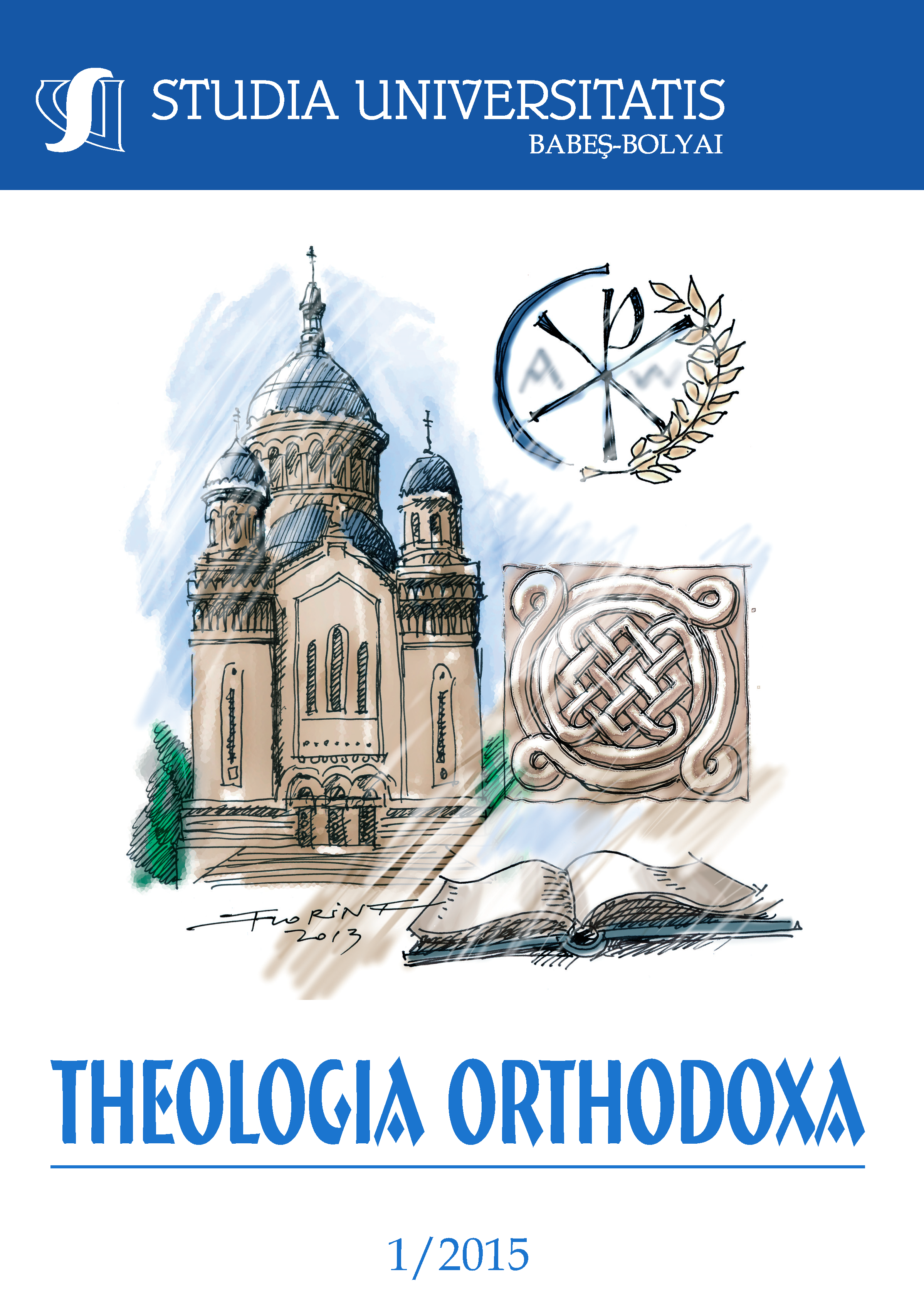PHENOMENOLOGY AND APOPHATIC THEOLOGY: THE RECEPTION OF ST DIONYSIUS THE AREOPAGITE IN JEAN-LUC MARION’S THOUGHT / FENOMENOLOGIE ȘI TEOLOGIE APOFATICĂ: RECEPTAREA SF. DIONISIE AREOPAGITUL ÎN GÂNDIREA LUI JEAN-LUC MARION
Keywords:
St. Dionysius the Areopagite, Jean-Luc Marion, Christian apophaticism, saturated phenomenon, subject, hermeneutics [EN];, Sf. Dionisie Pseudo-Areopagitul, Jean-Luc Marion, apofatism creștin, fenomen saturat, subiect, hermeneutică [RO].Abstract
This text analyses the reception of St Dionysius the Areopagite’s apophaticism in Jean-Luc Marion’s thought. After a dispute with Jacques Derrida, who claimed that negative theology returns to affirmations after having passed through negations, Marion reads Dionysius’ apophaticism in the same way the Tradition of the Church did. Hence, he asserts that apophaticism is a third way, beyond affirmations and negations. As Marion’s apology evolves, Dionysius’ influences on his thought appear in concepts such as God without being, distance, and saturated phenomenon. Furthermore, this study argues the role of the human being in apophatic theology. Because of his radical phenomenology of donation, Marion reverses intentionality in counter-intentionality, experience in counter-experience, and subject in adonné. From this point on, the subject/l’adonné seems to have no determinative role for apophatic gnoseology, although Church Tradition always affirmed the importance of faith and virtues for spiritual ascent. The solution proposed in this text makes a distinction between Kant’s transcendental and the conditions of possibility gained by hermeneutics, ascetics, liturgy, and divine grace. L’adonné has no previous Kantian conditions of possibility; however, it can create some conditions of possibility from previous saturated phenomena. These conditions do not jeopardize the excess of the saturation.
Acest text analizează receptarea apofatismului Sf. Dionisie Pseudo-Areopagitul de către gândirea lui Jean-Luc Marion. Într-o dispută cu Jacques Derrida, care afirma că teologia negativă revine la afirmații după o trecere prin negații, Marion înțelege apofatismul dionisian la fel cum îl înțelege Tradiția Bisericii. Astfel, el afirmă că apofatismul este o a treia cale dincolo de afirmații și negații. După cum arată apologia lui Marion, influențele lui Dionisie asupra gândirii sale sunt vizibile în concepte precum Dumnezeul fără ființă, distanța și fenomenul saturat. Mai mult, acest studiu argumentează în favoarea rolului omului în teologia apofatică. Datorită fenomenologiei radicale a donației, Marion răstoarnă intenționalitatea în contra-intenționalitate, experiența în contra-experiență și subiectul în adonat. În acest punct, subiectul/adonatul pare a nu avea niciun rol determinant pentru gnoseologia apofatică, deși Tradiția Bisericii a afirmat întotdeauna importanța credinței și virtuților pentru urcușul duhovnicesc. Soluția acestui text oferă o distincție între transcendentalul lui Kant și condițiile de posibilitate câștigate prin hermeneutică, asceză, liturghie și har dumnezeiesc. Adonatul nu are condiții de posibilitate kantiene și anterioare, dar poate crea unele din fenomenele saturate anterioare. Aceste condiții nu periclitează excesul saturației.
References
Caputo, John D., and Michael J. Scanlon. “Introduction: Apology for the Impossible: Religion and Postmodernism.” In God, the Gift, and Postmodernism, edited by John D. Caputo and Michael J. Scanlon, 1-19. Bloomington - Indianapolis: Indiana University Press, 1999.
Chițoiu, Dan. Repere în filosofia bizantină. Iași: Ed. Fundației Axis, 2003.
Dionisii Areopagitae, S. De mystica theologia. In Patrologia Graeca, vol. 3, edited by J.-P. Migne.
Gschwandtner, Christina M. Reading Jean-Luc Marion. Exceeding Metaphysics. Indiana Series in the Philosophy of Religion. Bloomington and Indianapolis: Indiana University Press, 2007.
Hart, Kevin. The Trespass of the Sign: Deconstruction, Theology and Philosophy. New York: Fordham University Press, 2000.
Horner, Robyn. Jean-Luc Marion: a theo-logical introduction. Burlington, VT: Ashgate Pub. Co, 2005.
Jones, Tamsin. A Genealogy of Marion's Philosophy of Religion: Apparent Darkness. Indiana Series in the Philosophy of Religion. Bloomington & Indianapolis: Indiana University Press, 2011.
Kearney, Richard. Debates in Continental Philosophy: Conversations with Contemporary Thinkers. Perspectives in Continental Philosophies. New York: Fordham University Press, 2004.
―――. The God Who May Be: A Hermeneutics of Religion. Bloomington: Indiana University Press, 2001.
Marion, Jean-Luc. Dieu sans l'être. 2ème éd. ed. Paris: Quadrige/Presse Universitaire de France, 1991. Arthème Fayard, Paris, 1982.
―――. Givenness & Hermeneutics. Translated by Jean Pierre Lafouge. Milwaukee, Wisconsin: Marquette University Press, 2013.
―――. Idolul și distanța. Translated by Tinca Prunea-Bretonnet. Edited by Daniela Pălășan. Scientific control by Cristian Ciocan. București: Humanitas, 2007.
―――. In Excess: Studies of Saturated Phenomena. Translated by Robyn Horner and Vincent Berraud. New York: Fordham University Press, 2002.
―――. "Saint Thomas d'Aquin et l'onto-théologie." Revue thomiste, no. 1 (January-March 1995).
―――. Vizibilul și revelatul: teologie, metafizicăă și fenomenologie [in Romanian]. Translated by Maria Cornelia Ică jr. Sibiu: Deisis, 2007.
Moreschini, Claudio. Istoria filosofiei patristice. Translated by Alexandra Cheșcu, Mihai-Silviu Chirilă and Doina Cernica. Iași: Polirom, 2009.
Turcan, Nicolae. "Postmetaphysical Philosophy and Apophatic Theology. From Jean-Luc Marion to the Paradoxical Status of Thought in Vladimir Lossky’s Theology." Studia Universitatis Babeș-Bolyai, Theologia Orthodoxa 58, no. 2 (2013): 215-26.
―――. "Sf. Dionisie Areopagitul în contextul filosofiei postmetafizice" [in Romanian]. Studia Universitatis Babeș-Bolyai. Theologia Orthodoxa LV (2010 2010): 179-94.
Published
How to Cite
Issue
Section
License
Copyright (c) 2015 Studia Universitatis Babeș-Bolyai Theologia Orthodoxa

This work is licensed under a Creative Commons Attribution-NonCommercial-NoDerivatives 4.0 International License.





 ISSN (print): 1224-0869, ISSN (online): 2065-9474, ISSN-L: 2065-9474
ISSN (print): 1224-0869, ISSN (online): 2065-9474, ISSN-L: 2065-9474